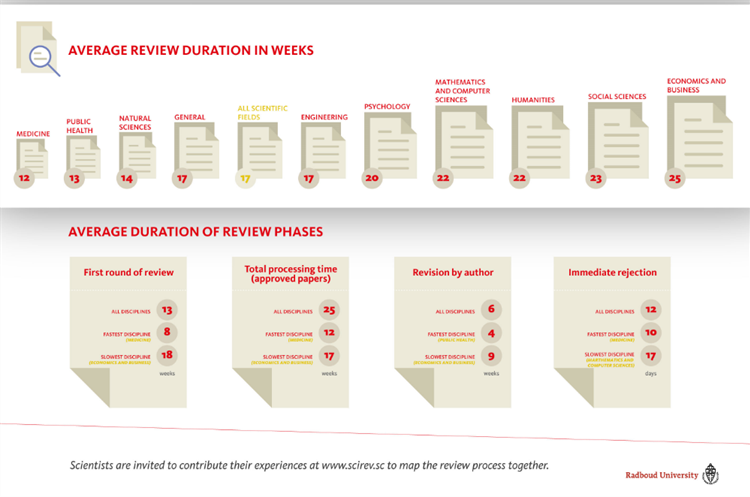Checking the research of colleagues is one of the most important pillars of academic practice. However, this so-called peer review has several weak points. Academics often complain about how long it takes. On the website SciRev.sc they are sharing their experiences. A publication from Jeroen Smits and Janine Huisman from Radboud University reveals several striking observations based on these experiences.
Worldwide there are about 28,000 academic journals that jointly publish 2.5 million articles per year. All those papers must be checked according to academic standards.
Experiences with the review process
Several years ago, Smits and Huisman launched the website SciRev.sc where academics can share their experiences with the peer review process. The site has since received more than 4000 responses and these provide an initial impression of how efficient different parts of the review process are.
Smits and Huisman discovered that the length of the review process differs considerably per discipline and journal and can be unreasonably long. Smits: "There are cases where researchers hear nothing for nine months and then receive a rejection." That can be a disaster for PhD candidates who must publish several articles in a short space of time.
Quick medics, slow economics
On average the entire review process takes about 17 weeks. It takes the longest for economists (on average about 25 weeks). The fastest review is that for medics (on average about 12 weeks). Despite this, the medics are least satisfied with the process.
Researchers can also rate their overall experience at SciRev and motivate that rating. These motivations show that besides a long duration of the process also bad communication by editors (not reacting on emails) and contradictory review reports are major sources of frustration.
Desk rejection
For researchers also the journal's first reaction is important, whereby editors inform the authors whether they are interested in the paper. A quick screening is generally enough for these 'desk rejection' decisions, but a substantial number of journals (in some fields 25%) takes more than four weeks for it.
Smits: "Given that no reviewers are involved, this duration gives a good indication of the efficiency of editorial offices. If journals use much time for this phase, they will probably also not be very efficient in finding reviewers or in handling review reports that come in."
Charity in an era of work pressure
Smits: "Given that many papers are rejected at least once, for each published paper the work of five or six reviewers may be needed. Reviewing an article takes between a half day and a whole day. That is a lot of time and it often has little priority for researchers." The millions of review processes represent a considerable workload in a world that is already well known for its work pressure.
Also the editors of journals often do their work alongside busy academic jobs and sometimes put articles to one side for a long time. Therefore, between submission and final decision, an article spends most of the time simply waiting on a pile with either the reviewers or the editor.
Smits: "This poses a dilemma for science. The publication process based on peer review is vital for the quality of science, but in its present form it is largely based on good will. Consequently, a process that is effectively just a few days' work often takes several months or more in practice."
Smits and Huisman call upon academics to report their experiences with the review process of scientific journals on the SciRev.sc website. All experiences are available on the website categorised according to journal or academic field. For a broad overview see www.scirev.sc/reviews. This information enables academics to make a better-informed choice for a journal.
More information: Janine Huisman et al. Duration and quality of the peer review process: the author's perspective, Scientometrics (2017). DOI: 10.1007/s11192-017-2310-5
Provided by Radboud University



















